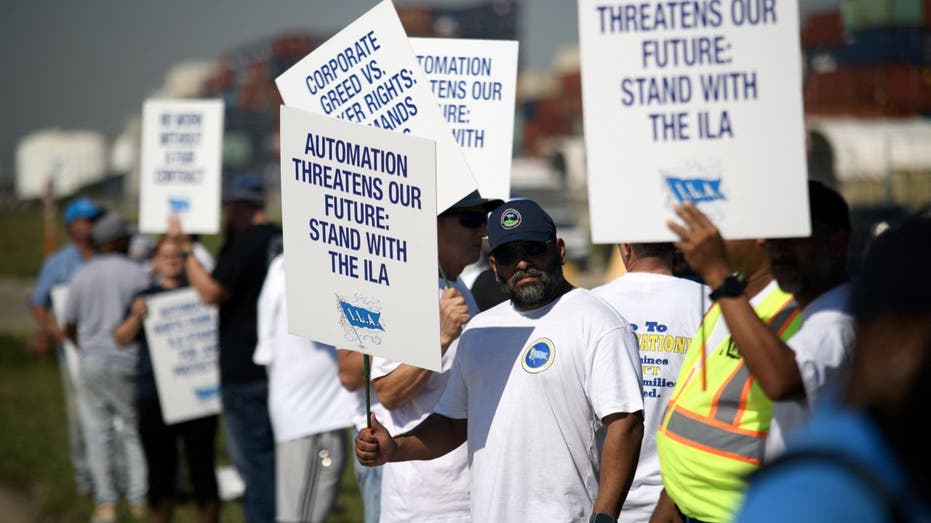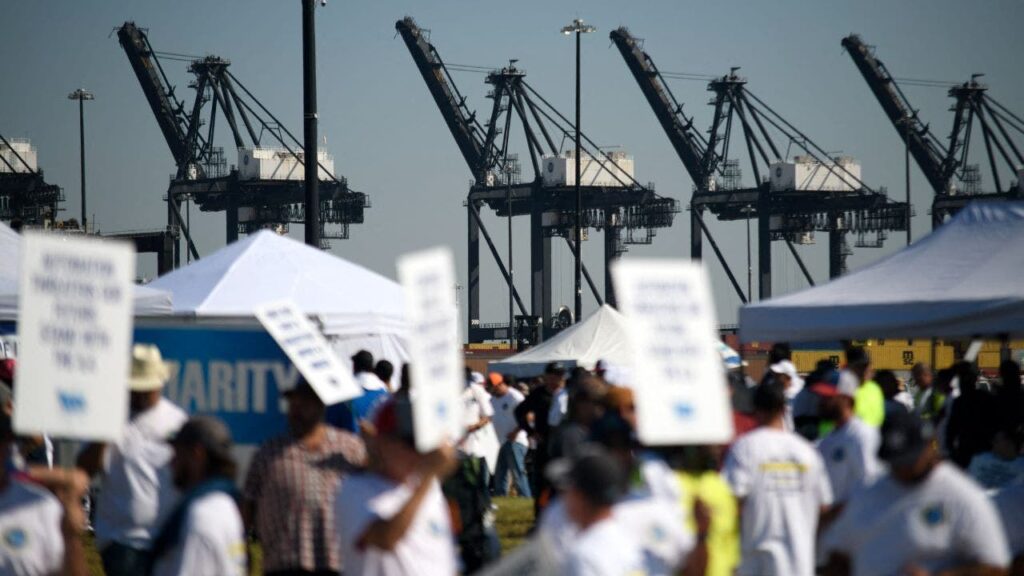A trade association said the distilled spirits industry and its consumers are facing impacts from the dockworker strike at East and Gulf Coast ports – and could experience even more if it continues.
Distilled Spirits Council of the United States CEO Chris Swonger on Wednesday told FOX Business that the industry is “very dependent on the vitality of the U.S. port system” and that even a day of work stoppage was “sending repercussions through the supply chain.”
His comments came ahead of tens of thousands of dockworkers represented by the International Longshoremen’s Association (ILA) on Thursday beginning their third day of strikes at three dozen ports along East and Gulf Coasts. They walked off the job after the ILA and the U.S. Maritime Alliance (USMX) were unable to reach an agreement on Monday before their expiring contract’s deadline.
Ports impacted by the ILA work stoppage handled 77% of U.S. distilled spirits exports and 43% of imports last year, according to the Distilled Spirits Councils.
That means the strikes could affect exports of spirits like American whiskey and imported spirits like cognac, Scotch whiskey, Irish whiskey, gin and certain liqueurs.
AUTOMAKERS MONITORING PORT STRIKE FOR IMPACTS ON PRODUCTION
“If, in fact, this strike continues for the long haul – a week or so, a couple of weeks, God forbid – it could ultimately have an impact on the industry’s top-selling season, which is typically October, November and December, for the holiday season, where our great customers will want to buy a special bottle of cognac or scotch or our consumers and lovers of American whiskey overseas in Europe might not be able to have access to the product,” Swonger explained.
“So if this strike continues, it could not only have a detrimental impact on the economics of the industry, but it can ultimately have a detrimental impact on consumers who love to savor great distilled spirits brands.”
Consumers could see prices of impacted distilled spirits go up as a result of the work stoppage at the East and Gulf Coast ports, according to the Distilled Spirits Council CEO.

“Our member companies are right now looking for alternative means of getting the product back and forth, and air transport, as you know, would be much more expensive than shipping transport,” Swonger told FOX Business. “Our member companies and supply chain folks in the member companies are all scrambling to look for alternative means, because no one knows how long the strike is going to be, and that just adds costs into the systems, so that could also have an impact on consumers.”
Some in the distilled spirits industry have also looked at West Coast ports as a potential alternative.
WILL DOCKWORKERS’ STRIKE CAUSE HIGHER FOOD PRICES? EXPERTS WEIGH IN
Swonger called on the ILA and USMX to “get to the negotiating table and get this resolved,” warning of job creation, economic and supply chain implications the strike could have not just for distilled spirits but for other sectors as well. DISCUS and other trade groups across various industries have also pushed for President Biden and his administration to end the work stoppage.
“The strike will cost the economy billions of dollars a day, impacting businesses large and small that are not party to the negotiations, but rely upon the free flow of goods, both imports and exports, through these critical ports,” the nearly 300 groups said in the Wednesday letter. “These port closures mean that our farmers are not able to sell their crops to overseas markets, manufacturers are not able to receive critical components for manufacturing facilities, retailers won’t be able to get their holiday merchandise in time and many other industries will be negatively impacted.”

JPMorgan has projected each day of work stoppage at the East and Gulf Coast ports could cost the economy up to $4.5 billion per day, FOX Business previously reported.
PORT STRIKE AND CRUISE LINES: WILL OPERATIONS BE DISRUPTED?
The ILA said earlier in the week its members would picket “for as long as it takes for the USMX to meet its contract demands.”
While the widespread port strike is occurring, the union has also vowed that its members will continue handling U.S. military cargo and work passenger cruise ships.
Eric Revell contributed to this report.
Read the full article here











